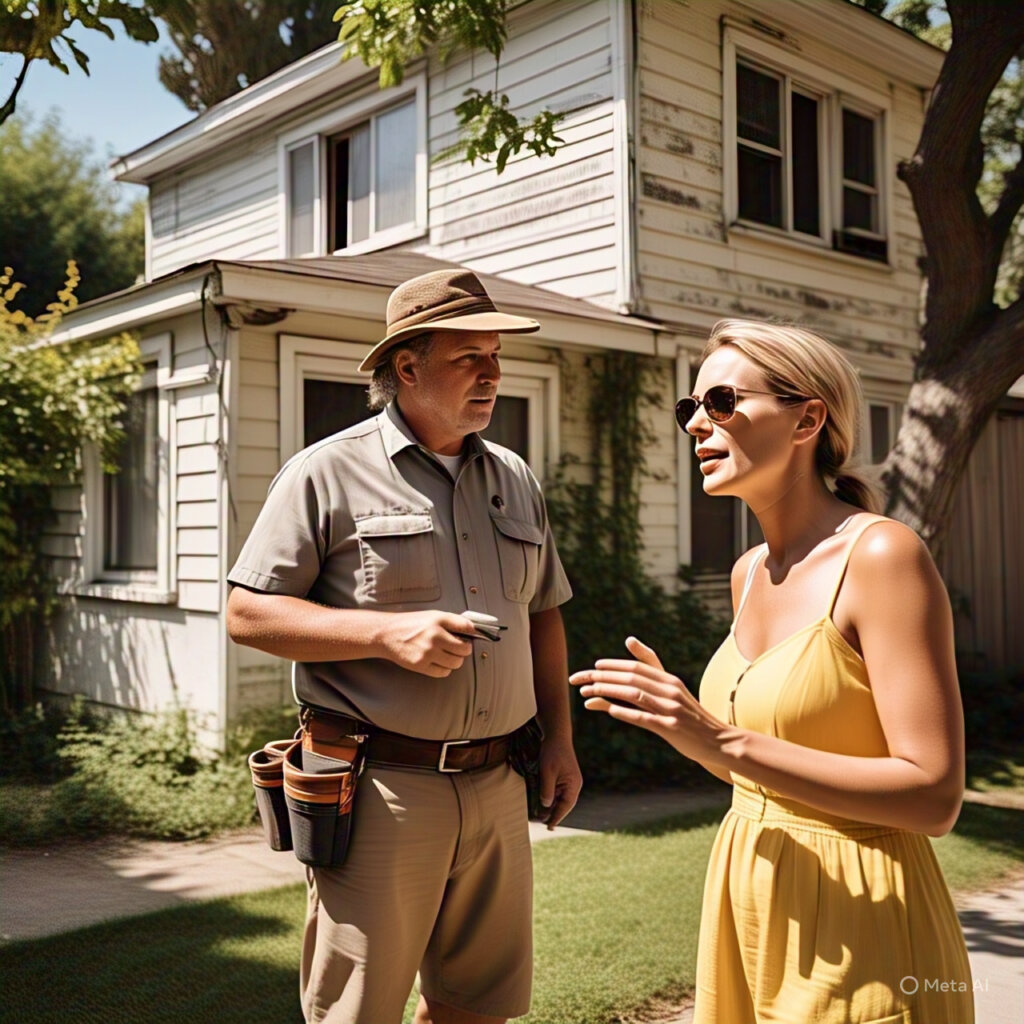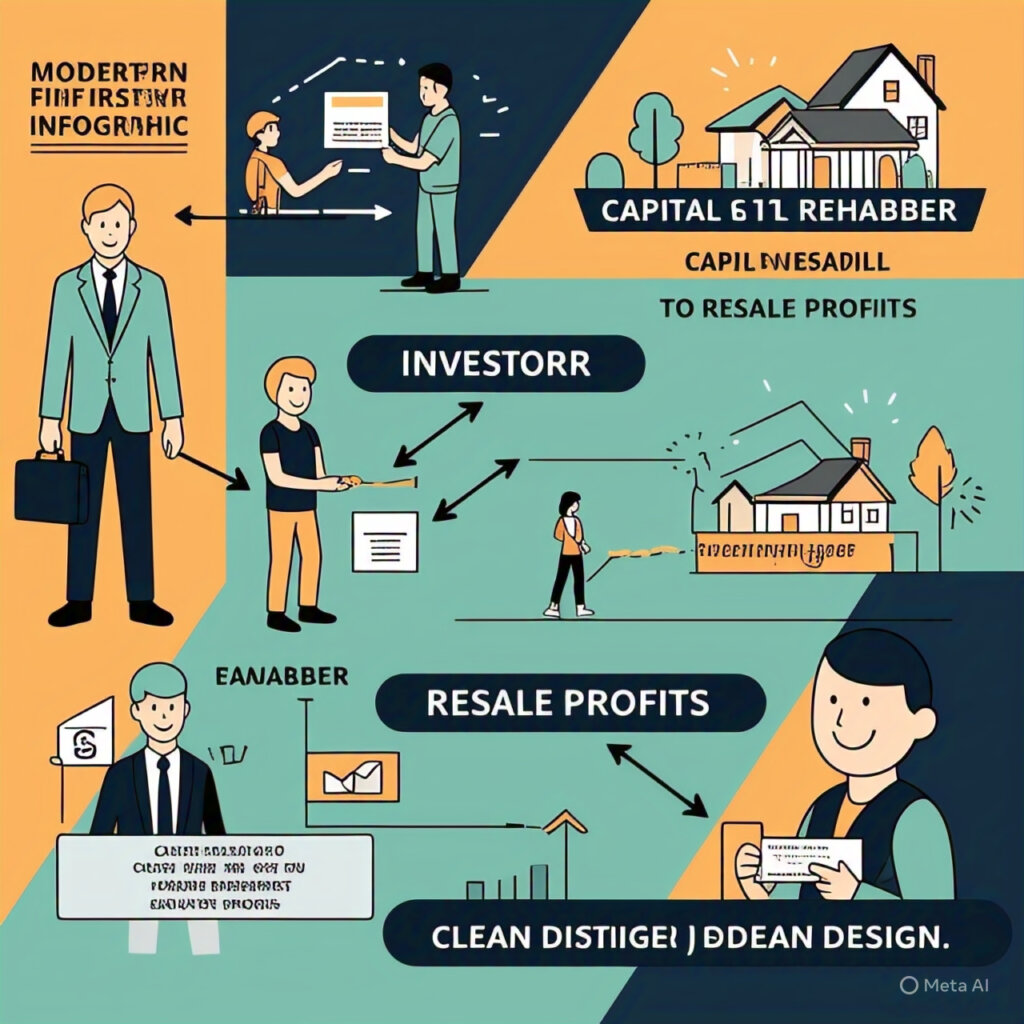How to Profit From Flipping Without Doing the Work
If you’ve ever said to yourself, “I want to invest in real estate, but I don’t want to swing a hammer or manage contractors,” this post is for you.
In 2025, more investors are waking up to a powerful truth: you can build wealth in real estate without owning rental properties, managing tenants, or flipping houses yourself.
This blog is your blueprint to just that, by letting your capital do the heavy lifting while someone else hustles to make the deals profitable.

You’ll learn how to:
Work with experienced rehabbers who flip houses
Fund projects while avoiding the headaches of renovations
Structure agreements to protect your investment
Spot red flags and avoid shady operators
Grow your money through smart passive investing
Let’s break down the strategy that’s quietly helping professionals, retirees, and entrepreneurs profit from real estate without doing dirty work.
What Does It Mean to Be a Passive Partner?
When you invest in a real estate deal as a passive partner, you’re essentially becoming the bank. You put up the capital, and a more experienced operator does the work—finding the property, managing the rehab, marketing the resale, and closing the deal.
This arrangement lets you earn a portion of the profits (or fixed returns), without:
Managing renovations
Screening tenants
Dealing with permits or contractors
Chasing after late rent
This model is ideal for:
Professionals with high income but no time
People near retirement who want safe, collateral-backed growth
New real estate investors looking to learn while earning
Parents looking to passively build generational wealth
It’s the definition of your money, their hustle—you’re not just parking cash, you’re putting it to work.
Why Rehabbers Need Your Capital
Even seasoned flippers run into a common challenge: capital.
Banks don’t like lending on distressed properties. Hard money loans come with high fees and interest rates.
So, when rehabbers find great deals, they often look to private lenders or capital partners to fund the purchase and renovation.
That’s where you come in.

By working with the right flipper, you can:
Fund deals with strong equity positions
Get paid before the operator’s profits
Secure your investment with real property as collateral
This model is a win-win—flippers get fast funding, and you get access to real estate profits without lifting a hammer.
Three Ways to Structure the Relationship
There are three common ways to earn passively from someone else’s flip:
1. Private Lending (Debt Position)
You loan the investor funds for a set return (e.g., 10–12% annualized)
Terms are documented in a promissory note
You’re paid back with interest
Collateralized by a recorded mortgage or deed of trust
Pros: Predictable income, less risk, you get paid first
Cons: No upside in excess profits
2. Equity Partner (Profit Split)
You provide funding and share profits from the resale
Usually, a 50/50 or 60/40 split depending on risk
May or may not include collateral
Pros: Bigger upside if the project performs well
Cons: Profits aren’t guaranteed, and you may wait longer for returns
3. Hybrid Structure
You receive a preferred return (e.g., 8–10%)
After that, profits are split
Collateralized and structured through an LLC
Pros: Best of both worlds, income + upside
Cons: Requires legal setup and clear operating agreements
Real-World Example: Mike & Sarah
Mike is a contractor-turned-flipper. Sarah is a marketing executive with $150K to invest but no experience in real estate. They met through mutual contact and structured a deal like this:
Mike found the deal: a $180K distressed property with a $100K rehab budget and a projected $400K resale
Sarah funded $280K total for purchase and rehab
Sarah received a preferred 10% return on her capital, plus 40% of the net profit
After six months, the property sold for $395K. After all costs, the profit was $65K. Sarah earned $28K from her preferred return and share—over 18% annualized.
Mike earned money, kept his team working, and didn’t have to worry about bank financing.

What Should You Look for in a Partner?
Before you hand over your money, you need to vet your operator. Ask these key questions:
How many flips have you completed?
Can I see past deals—photos, numbers, timelines?
Do you have a reliable contractor team?
What happens if the deal goes sideways?
Can I get a promissory note and lien on the property?
Will you provide title insurance and a closing attorney?
Look for transparency, a detailed process, and referrals. If they get defensive or vague, walk away.
How to Protect Your Investment
Even with the right partner, smart investors protect their downside. Here’s how:
Document everything: Use a real estate attorney to draft the loan or JV agreement
Use a title company: Close the transaction formally like a bank would
Record a lien: If you’re lending, record a mortgage or deed of trust
Track progress: Ask for photos, receipts, and updates
Don’t fund it all up front: Use draws based on rehab milestones
If you’re putting up the money, you have the right to protect your capital. Don’t apologize for due diligence.
These questions can all be answered by contacting us.
Here are a few of the answers to questions that might have come to mind:
We always use an attorney owned title company.
Funding is always wired to the title company, never give money to any investor.
Every deal we do that uses a private investor has the investor named as lienholder, with title insurance.
Of our team of 3 one of us has a real estate license, which means we also control the sale of the property. We list it and other agents bring the buyers if we don’t already have a buyer secured.
What Can You Expect to Earn?
Returns vary based on structure and risk. Here are realistic ranges:
Private Lending: 8–12% annualized return
Equity Partner: 20–35% ROI, but with more risk and variable timing
Hybrid: 10% preferred return + 30–40% profit share
These numbers beat most stock market yields and offer real-asset collateral.
Passive Doesn’t Mean Blind
Just because you’re not swinging hammers doesn’t mean you’re hands-off. You should:
Understand the numbers
Know the comps
Review of the budget
Get clear on timelines and exits
Ask for regular updates
The most successful capital partners are informed investors. Be curious. Ask questions. Get educated.
Get Paid for Letting Others Hustle
If you have money and want to grow it without becoming a full-time landlord or rehabber, this strategy is gold. By aligning with experienced flippers, you turn your savings into a revenue-generating engine.
Just make sure:
You vet the people
You secure your deal
You protect your downside
You diversify your risk
This isn’t just a good side income, it’s a professional investment model.
With the right setup, you’ll never have to paint a wall or deal with a city inspector—and your money will still be building your legacy.
It’s time to let your money hustle harder than you do.
If you haven’t seen our other posts in this series, you can find them here to learn more: https://www.ourcashforyourhome.com/blog/
Contact me today for more information to get started
Here’s the link for the one that came out last week. Read it here.
